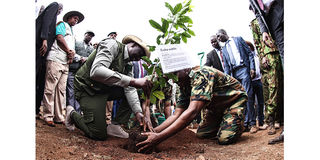Learn from Costa Rica’s success story

President Dr William Ruto plants a tree at Kona Baridi in Kajiado County on December 21, 2022. This was during the official launch of the Government’s “National Tree Growing and Restoration Campaign”, to inspire the nation to attain a 30 percent tree cover by 2032.
On environmental conservation, Kenya has much to learn from peers. One example is Costa Rica, which had the highest deforestation rates in the 1990s.
Unsustainable agricultural expansion and logging led to over 75 per cent loss of forest cover. Kenya is on a similar path, prioritising unsustainable development and profit over conservation, hence a decline in forest cover to 7.2 per cent.
In response, Costa Rica introduced the Payment for Ecological Services (PES) programme in the 1990s. That provided economic incentives to citizens to restore and conserve forests with over 18,000 households directly benefiting by 2021. As a result, it managed to reverse deforestation and increase forest cover to over 52 per cent.
Kenya should work with indigenous communities to implement localised solutions for forest protection, reforestation and agroforestry. Socioeconomic incentives would encourage people to choose conservation as a pathway to development. Long-term goal strategies that entrench sustainable use of forests must be adopted.
The government should also encourage sustainable consumption while prioritising tree planting. Nearly 95 per cent of the population still uses firewood as a source of energy, leading to the largest percentage of trees being felled for charcoal in urban areas and firewood in rural homes. A cheaper alternative should be fast-tracked by subsidising LPG.
Kenya needs to regulate large-scale timber industries—like requiring logging factories to grow and maintain a determined acreage of plantation forest. Incentives like tax exemptions for companies that exceed their allocated quotas will encourage them to plant more trees as their source of raw material. To bolster agroforestry, factories should be encouraged to contract individual farmers to plant and supply them with timber.
Public-private partnerships, particularly in the restoration of community forests, can boost tourism. A thriving eco-tourism in the country of 5.2 million got over three million tourists in 2019 with 60 per cent drawn to eco-conservation.
Mr Kosgei is an award-winning social entrepreneur. [email protected].





